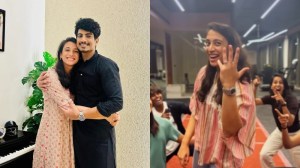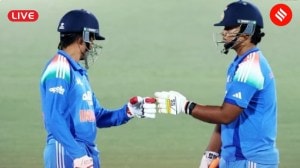Stay updated with the latest - Click here to follow us on Instagram
Govt defends CVC: ‘Chargesheet is not a stigma’
Attorney General contended after appointment as secy,no clearance is needed for CVC post.
The government on Thursday told the Supreme Court that once a bureaucrat is given a vigilance nod for appointment as secretary,no further clearance is required to be empaneled for the appointment as Central Vigilance Commissioner.
“Once a person is appointed as secretary on clearance by CVC,he can be considered for empanelment and no further inquiry is required,” Attorney General G E Vahanvati submitted before a Bench headed by Chief Justice S H Kapadia.
Vahanvati made the submission while responding to various questions by the Bench,which also sought his view on the criteria of impeccable integrity required for appointment as Central Vigilance Commissioner.
“Impeccable integrity is an important requirement,” Vahanvati said,responding to queries from the Bench.
But as the Bench asked,”Does it apply to all cases where there is a stigma of chargesheet”,the attorney general said,”This is a grey area.”
The law officer contended that filing of the chargesheet is not a stigma when the Bench posed a question.
The court wanted to know if a bureaucrat,accorded vigilance clearance for appointment as secretary,does not require any further examination for appointment for posts above that of the secretary.
During the hearing,advocate Prashant Bhushan,appearing for the Centre for Public Interest litigation,which has moved the court challenging appointment of P J Thomas as CVC,said various factors about the Palmolein import case were not before the CVC when it gave vigilance clearance to Thomas.
The CVC had not taken into account the chargesheet pending against him,he claimed,adding the issue of sanction for his prosecution by the state government was not brought before the anti-corruption watchdog.
The case diary was also not brought before the CVC,he said,contending that the report of the committee of public undertaking in Kerala was also not presented before it.
“The CVC gave clearance to Thomas only on the basis of the note placed before it by the Department of Personnel and Training,” he said.
“The CVC cannot be the final authority,” the Bench said,stressing that the appointment has to be in accordance with the Vineet Narain judgement which makes it clear that the CVC has to remain independent,impartial,free and fair and uninfluenced by political executives.
Vahanvati said the criterion of an outstanding person with impeccable integrity has to be taken undoubtedly into the consideration for appointment as CVC.
The Bench,however,said,that in the given case,the issue of chargesheet and sanction for prosecution of Thomas were not considered by the Personnel and Training ministry and others.
The Bench wanted to know if the material facts were not considered,then what would be the position.
Vahanvati also said that the vigilance clearance given by the CVC to Thomas in 2007 was not challenged by anyone.
“Nobody ever challenged what the CVC said. All these facts were placed before him (CVC),” he said.
He said there was a detailed office memo in 2005 dealing with the case in which the state government had said that the whole case has to be withdrawn.
While Vahanvati was making the submission,the Bench asked if the CVC can say that there is no merit in a case pending before the High Court when a chargesheet too has been filed in it.
Totality of the circumstances has to be considered in the case,the Bench said.
At this,the attorney general said,”All sorts of allegations are being levelled.”
This prompted the Bench to remark,”That is why we are not on the merits of the case but only examining it on the law.”
The court also wanted to know if the CVC report on Thomas was placed before the committee headed by the Prime Minister,which went into the selection of CVC.
The Attorney General said it is never placed before the committee.
“It is not required to be placed once empanelment is given. Once there is a CVC clearance and empanelment,it is difficult to hold another enquiry,” he said.
At this point,senior advocate K K Venugopal submitted that Thomas has never gone to court relating to the case.
“You cannot have both the ways. You cannot say the matter is pending in the Supreme Court and also that you have not gone to the court,” the judges said.
The Bench made the remark about Thomas having both ways,referring to a petition filed by former Kerala Chief MinisterK Karunakaran opposing his prosecution in the Palmolein import case.
Vahanvati said it was legitimate to proceed on the basis of the CVC clearance for Thomas’ empanelment for appointment as CVC.
“There was no impediment for his appointment as the CVC on the basis of the pending case,” he said.
“There was also no requirement for recording the reasons for his appointment,” he said in reply to another question by the bench if any reason had been given for his selection as CVC.
Senior advocate Venugopal commenced the argument on behalf of Thomas contending that he is a victim of the clash between two political parties.
The bench wanted to know from him if any independent disciplinary inquiry was conducted against him or not.
“Why there is no such inquiry in this case?” the Bench asked referring to an apex court judgement.
Venugopal said empanelment was cleared by the CVC on the basis of a note prepared by the DoPT.
“When he is facing a charge under Section 120 B of the IPC,is it in the realm of the CVC to travel beyond the due process. How can CVC clear him?” the bench asked.
Venugopal said because of some political differences in the state,the case was filed in the Palmolein import.
“On the contrary,when you know there is a see-saw political battle,it is all the more necessary for the state government to order an independent inquiry into the case,” the Bench said.
Venugopal,in his submission,said the bureaucrat functions under the control of the state government but the power to remove vests with the Centre.
He said the state government has a right to prepare a charge sheet and give him an opportunity to be heard on the report as forwarded to the Centre,which on that basis conducts further inquiry and removes an officer.
The court,however,asked,”Is there any bar on the Central government to conduct its own inquiry without
reference from the state?”
There is nothing in the rule to prevent Centre from conducting its own inquiry,the Bench remarked.







